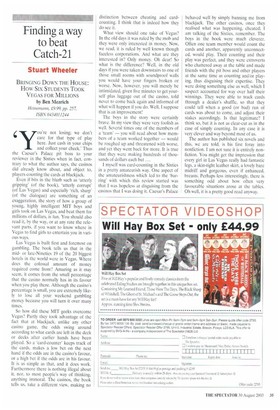Finding a way to beat Catch-21
Stuart Wheeler
BRINGING DOWN THE HOUSE: HOW SIX STUDENTS TOOK VEGAS FOR MILLIONS by Ben Mezrielt Heinemann, £9.99. pp. 257, ISBN 0434011244 ‘ you're not losing; we don't care for that type of play here. Just cash in your chips and collect your check.' Thus the Caesar's Palace pit boss to your reviewer in the Sixties when in fact, contrary to what the author says, the casinos did already know about, and object to, players counting the cards at blackjack.
Even if bits in the blurb such as 'utterly gripping' (of the book), 'utterly corrupt' (of Las Vegas) and especially 'rich, sharp' (of the dialogue) are something of an exaggeration, the story of how a group of young, highly intelligent MIT boys and girls took on Las Vegas, and beat them for millions of dollars, is fun. You should also read it, by the way, or at any rate the relevant parts, if you want to know where in Vegas to find girls to entertain you in various ways.
Las Vegas is built first and foremost on gambling. The book tells us that in the midor late-Nineties 19 of the 20 biggest hotels in the world were in Vegas. Where does the colossal amount of money required come from? Amazing as it may seem, it comes from the small percentage that the casino normally has in its favour when you play there. Although the casino's percentage is small, you are extremely likely to lose all your weekend gambling money because you will turn it over many times.
So how did these MIT geeks overcome Vegas? Partly they took advantage of the fact that at blackjack, unlike any other casino game, the odds swing around according to what cards are left in the deck or decks after earlier hands have been played. So a 'card-counter' keeps track of the cards. makes a low bet on the next hand if the odds are in the casino's favour, or a high bet if the odds are in his favour. It is as simple as that, and it does work. Furthermore there is nothing illegal about it, nor, to most people's way of thinking, anything immoral. The casinos, the book tells us, take a different view, making no distinction between cheating and cardcounting. I think that is indeed how they do see it.
What view should one take of Vegas? In the old days it was ruled by the mob and they were only interested in money. Now, we read, it is ruled by well known though faceless corporations. And what are they interested in? Only money. Oh dear! So what is the difference? Well, in the old days if you were taken downstairs to one of those small rooms with soundproof walls you would have your fingers broken or worse. Now, however, you will merely be intimidated, given five minutes to get yourself plus luggage out of the casino, told never to come back again and informed of what will happen if you do. Well, I suppose that is an improvement!
The boys in the story were certainly brave. In my view they were very foolish as well. Several times one of the members of a 'team' — you will read about how members of a team worked together — would be roughed up and threatened with worse, and yet they went back for more. It is true that they were making hundreds of thousands of dollars each but ....
I myself was card-counting in the Sixties in a pretty amateurish way. One aspect of the amateurishness which led to the 'barring' with which this review started was that I was hopeless at disguising from the casinos that I was doing it. Caesar's Palace
behaved well by simply banning me from blackjack. The other casinos, once they realised what was happening, cheated; I am talking of the Sixties, remember. The boys in the book were much cleverer, Often one team member would count the cards and another, apparently unconnected, would play. Their counting and their play was perfect, and they were extroverts who chattered away at the table and made friends with the pit boss and other players at the same time as counting andlor playing, thus disguising their expertise. They were doing something else as well, which I suspect accounted for way over half their winnings. They were able to track cards through a dealer's shuffle, so that they could tell when a good (or bad) run of cards was about to come, and adjust their stakes accordingly. Is that legitimate? I think so, but it is not as clear-cut as in the case of simply counting. In any case it is very clever and way beyond most of us.
The author has published six novels and this, we are told, is his first foray into nonfiction. I am not sure it is entirely nonfiction. You might get the impression that every girl in Las Vegas really had fantastic legs, a skin-tight leather skirt, a lovely bare midriff and gorgeous, even if enhanced. breasts. Perhaps less interestingly, there is something odd about how often very favourable situations arose at the tables. Oh well, it is a pretty good read anyway.


























































 Previous page
Previous page